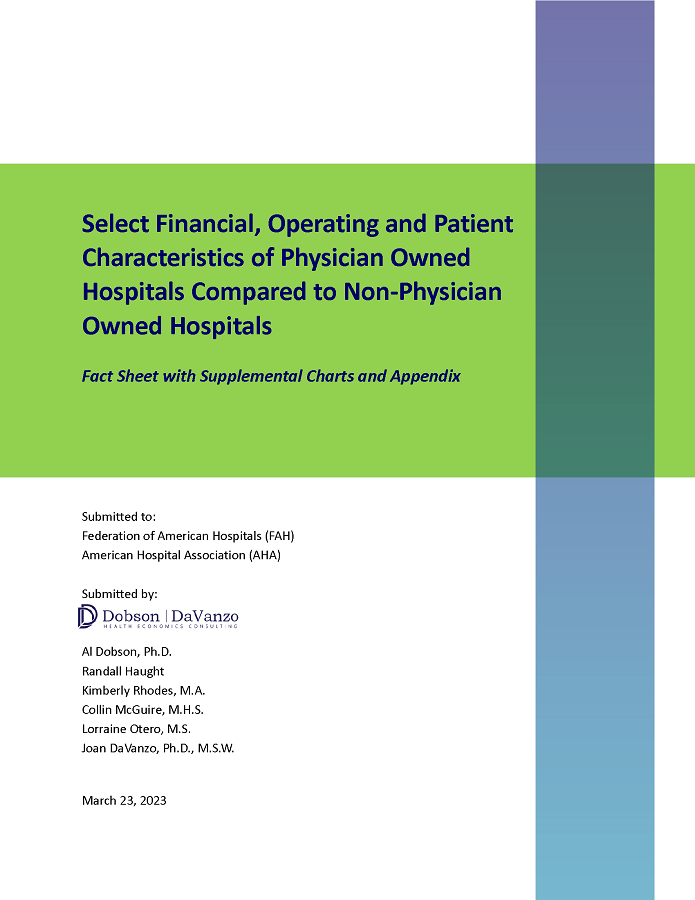

New Analysis Reaffirms Need to Maintain Current Law Banning Self-Referral to Physician-Owned Hospitals
WASHINGTON, D.C., March 28, 2023 - Data from the health care consulting firm Dobson | Davanzo, released today by the Federation of American Hospitals (FAH) and the American Hospital Association (AHA), shows that physician-owned hospitals (POHs), when compared to other hospitals, treat less medically complex and more financially lucrative patients, provide fewer emergency services, and treat fewer COVID-19 cases.
Further, these arrangements have patient care margins more than 15 times those of non-POHs, they render less uncompensated care, and they treat proportionally far fewer dual-eligible (Medicaid and Medicare) patients. Even though POHs provide care to fewer patients with complex conditions, they are five times more likely to receive CMS’ maximum penalty for readmissions.
This new analysis compares operating, financial, and patient characteristics of POHs and non-POHs. It reinforces many of the findings of earlier studies by the Department of Health and Human Services’ Office of Inspector General, the Government Accountability Office, and MedPAC, among others, documenting the conflicts of interest inherent with POHs that led to the Congressional ban in 2010. These reports concluded that POHs:
- Cherry-pick patients by avoiding the less profitable Medicaid and uninsured patients;
- Treat fewer medically complex patients; and
- Provide fewer emergency services and often rely on publicly funded 911 services and acute care, community hospitals for these services for their own patients.
“If there was ever any doubt, the evidence against POHs is as crystal clear today as it was when Congress passed the self-referral ban in 2010,” said Chip Kahn, President and CEO of the FAH. “Weakening or unwinding the current ban opens the door further to the very behaviors that Congress sought to prevent.”
“The growth of physician-owned hospitals was restricted by Congress for good reasons and those remain valid today as this analysis shows,” said Rick Pollack, President and CEO of the AHA. “Physician-owned hospitals undermine our nation’s health care safety-net and jeopardize access to care by cherry-picking the most profitable cases and avoiding patients with complex conditions and lower-reimbursing coverage.”
View the full report at https://www.aha.org/fact-sheets/2023-03-28-select-financial-operating-and-patient-characteristics-pohs-compared-non-pohs-fact-sheet.
###
Contact: Colin Milligan, cmilligan@aha.org
Sean Brown, sbrown@fah.org
About the American Hospital Association (AHA)
The American Hospital Association (AHA) is a not-for-profit association of health care provider organizations and individuals that are committed to the health improvement of their communities. The AHA advocates on behalf of our nearly 5,000 member hospitals, health systems and other health care organizations, our clinician partners – including more than 270,000 affiliated physicians, 2 million nurses and other caregivers – and the 43,000 health care leaders who belong to our professional membership groups. Founded in 1898, the AHA provides insight and education for health care leaders and is a source of information on health care issues and trends. For more information, visit the AHA website at www.aha.org.
About the Federation of American Hospitals (FAH)
The Federation of American Hospitals (FAH), founded in 1966, is the national representative of more than 1,000 tax-paying community hospitals and health systems throughout the United States. FAH members provide patients and communities with access to high-quality, affordable care in both urban and rural areas across 46 states, plus Washington, D.C and Puerto Rico. Our members include teaching, acute, inpatient rehabilitation, behavioral health, and long-term care hospitals and provide a wide range of inpatient, ambulatory, post-acute, emergency, children’s, and cancer services. These tax-paying hospitals account for nearly 20% of U.S. hospitals and serve their communities proudly while providing high-quality health care to their patients.

